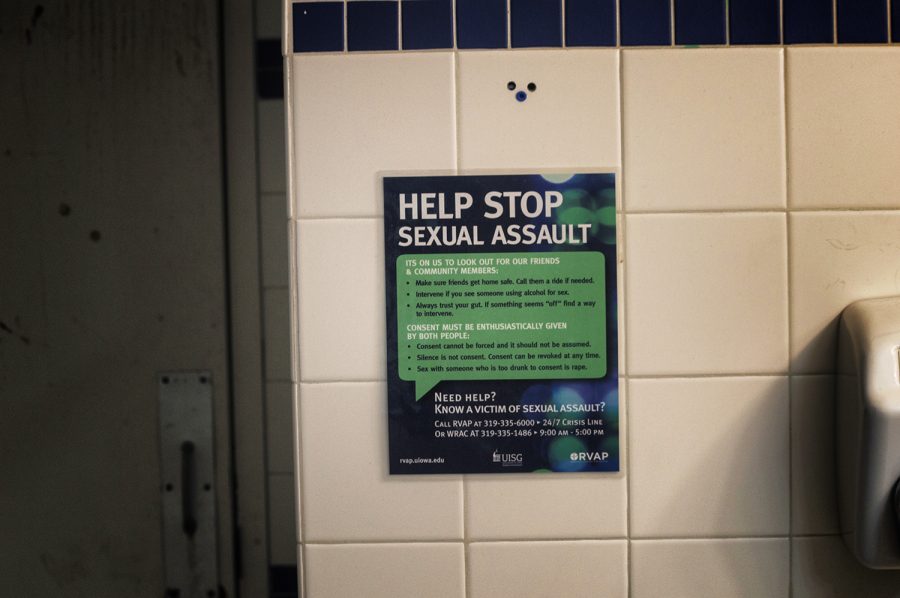Opinion | Statute of limitations on sexual assault do not bring justice
Statute of limitations on sexual assault are out of date and should be abolished.
Signs say, “Help Stop Sexual Assault” in the bathrooms on Wednesday, Sept. 26, 2018.
July 20, 2021
There should not be a statute of limitations on sexual assault in this state or any other.
The existence of a statute of limitations — for some crimes — is reasonable. It limits the state’s power to prosecute someone indefinitely for petty crimes committed long ago.Outside of sexual crimes… statutes of limitations work to keep the courts as well greased as can be. It does this by forbidding prosecution after a set period of time, so that convictions come about through hard evidence, rather than evidence which may deteriorate over time.
This can be a good thing. Should an 80-year-old woman be charged with some misdemeanor she committed when she was 20? Probably not. But it is not cases like this which are the problem.
For sexual crimes, a statute of limitations is basically a get out of jail free card.
Like most laws, the statutes of limitations vary greatly from state to state. In Iowa, legal proceedings must begin within 10 years of the crime being committed. But the problem is this: the trauma which results from these crimes lasts a long, long time, and people may not be ready to seek out a legal course of action until they have healed enough to revisit that pain. Taking action as bold as a civil proceeding can bring trauma to the surface.
But what if it takes longer to heal than the amount of time granted by a statute of limitations? Why should the law put a timeframe on justice, when the aggressor’s actions have a lifelong effect?
According to the Rape, Abuse, & Incest National Network (RAINN), only 310 out of 1,000 sexual assaults are reported to the police. Out of those 310, 50 reports lead to an arrest and only half of those will be incarcerated. They cite severalreasons as to why so few cases get reported, such as fear of retaliation or believing the police would not do anything to help.
Do not be mistaken–it is not the fault of the survivors that these aggressors walk the streets. That fault lies with the aggressors themselves, and with the failures of the justice system, and with a distressing lack of prevention among college campuses and other places. At the University of Iowa, a mandatory self-paced ICON course taken by freshmen only to be forgotten months later is simply not enough.
It is not the fault of the survivors, and it is not their responsibility either. It is a gross misstep to tell anyone how to respond to a violation such as this or do anything at all other than offer resources and support and prevention. One of those resources, though, is the so-called justice system, and it can always do better.
Shannon Keeler, a student from Gettysburg College, received a confession from her abuser years later that he sexually assaulted her in her dorm room. But somehow, that was not enough. The district attorney, Brian Sinnett did nothing, saying “he can’t file charges unless a case meets the high bar needed for conviction.”
These laws , such as having 10 years to report the sexual abuse to law enforcement in Iowa, are out of date. A statute of limitations — on sexual assault or otherwise — exists to ensure that no one is unfairly prosecuted. The idea behind this is that after a number of years passes, evidence will not be reliable enough for a sound conviction. But these laws were established before DNA evidence became such a powerful tool.
DNA evidence is now the most critical factor in the courtroom when it comes to cases of sexual assault. Since DNA can be safely stored for a period of time which is longer than the statute decrees, and since these crimes have a lifelong impact on survivors, these laws simply should not exist.
However, there are still obstacles within the sphere of DNA evidence. Surprisingly, some hospitals do not have forensic kits (also known as rape kits), meaning survivors could have to drive a long way before evidence can even be collected. Additionally, hospitals can only store DNA for a set number of years if the crime goes unreported, which varies from state to state.
But the statute of limitations is just a small part of a larger problem. Our energy and resources should be put into prevention and support. If you are looking to help, check out rainn.org and read up on their efforts in volunteering and public policy.
National Sexual Assault Hotline: 1-800-656-4673
Columns reflect the opinions of the authors and are not necessarily those of the Editorial Board, The Daily Iowan, or other organizations in which the author may be involved.














